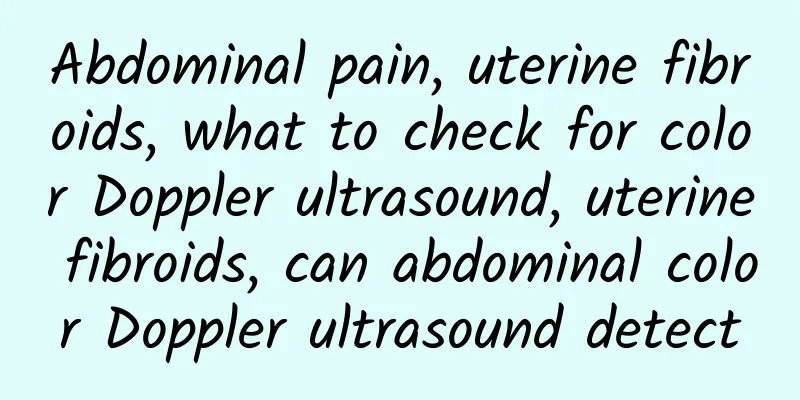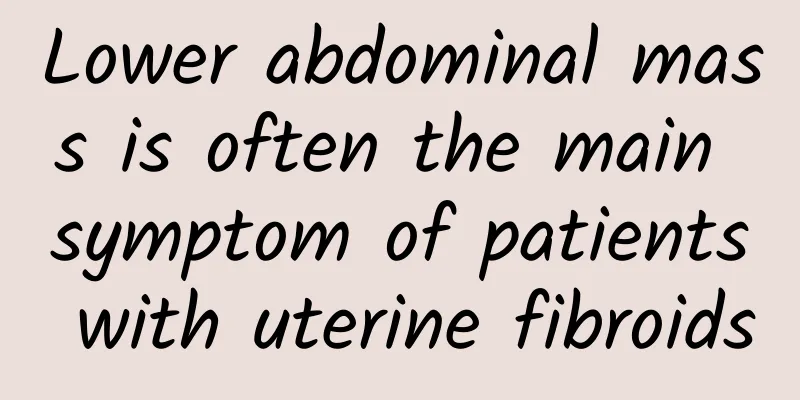What medicines are used after uterine fibroid surgery? What Chinese patent medicines are taken after uterine fibroid surgery?

|
What medicines are used after uterine fibroid surgery? - Learn about postoperative drug treatment Uterine fibroids are common benign tumors in gynecology. Surgery is currently one of the main methods for treating uterine fibroids. However, postoperative drug treatment is equally important, which can help postoperative recovery and prevent postoperative complications. So, what drugs are used after uterine fibroid surgery? The following will introduce you in detail. 1. Postoperative antibiotics to prevent infection After uterine fibroid surgery, the surgical area is prone to become a source of bacterial infection. Therefore, patients usually receive antibiotic treatment for a period of time after surgery to prevent infection. Commonly used antibiotics include penicillins, cephalosporins, etc. Generally speaking, doctors will choose appropriate antibiotics based on the specific conditions of the patients after surgery, and guide patients to take them on time and in the right amount. 2. Postoperative analgesics – relieve pain After uterine fibroid surgery, patients may experience varying degrees of pain. In order to relieve the patient's pain, the doctor will give appropriate analgesics as needed. Commonly used analgesics include nonsteroidal anti-inflammatory drugs (such as ibuprofen, aspirin, etc.) and opioids. However, long-term and high-dose use of opioids has the risk of addiction and dependence. Therefore, patients should use analgesics reasonably according to the doctor's advice. 3. Postoperative hormone drugs - regulating hormone levels The occurrence of uterine fibroids is related to the imbalance of hormone levels. Therefore, the use of hormone drugs after surgery can help regulate the body's hormone levels and promote postoperative recovery. Commonly used hormone drugs include estrogen and progesterone. These drugs need to be reasonably allocated by doctors according to the specific conditions of the patient to achieve the best treatment effect. 4. Other drug treatments after uterine fibroid surgery In addition to the above-mentioned drug treatments, other drug treatments can be combined with uterine fibroid surgery according to the specific condition. For example, for postoperative anemia, iron supplements and other drugs can be given; for irregular bleeding after surgery, Chinese patent medicines can be used to regulate menstruation; for patients with weak constitutions after surgery, nutritional drugs can be supplemented. in conclusion: Drug treatment after uterine fibroid surgery is an important part of postoperative recovery and prevention of complications. Commonly used drugs include antibiotics, analgesics, hormone drugs, etc. However, drug treatment still needs to be carried out under the guidance of a doctor and should be individualized according to the patient's specific condition. At the same time, patients need to pay attention to the occurrence of adverse reactions during drug treatment and communicate with the doctor in a timely manner. Finally, while taking drug treatment, reasonably adjusting lifestyle habits and diet, maintaining physical and mental health, will help postoperative recovery. |
Recommend
Comparison of three surgical methods for Bartholinitis
Expert introduction: There are many ways to treat...
Let me introduce you to the clinical manifestations of vulvar leukoplakia
Vulvar leukoplakia is quite harmful to female fri...
Brief introduction to two surgical treatments for ectopic pregnancy
As more and more patients with ectopic pregnancy ...
Are infertile women more likely to develop uterine fibroids? Causes of infertile women developing uterine fibroids
Generally speaking, the reasons why women who hav...
Brief analysis of several common symptoms of tuberculous pelvic inflammatory disease
Clinically, the symptoms of different patients wi...
Analyze the common risk factors of vaginitis
Vaginitis is a gynecological disease that can occ...
How long can I go back to work after a miscarriage? Learn the important time points to spend the confinement period
Nowadays, many young women get pregnant unexpecte...
What happens to menstruation after curettage?
What happens to menstruation after curettage? The...
Is walking the right thing to do? 8 tips to help you lose weight easily
In order to stay healthy, lose weight, or relieve...
Diet therapy for patients with spleen and kidney yang deficiency type pelvic inflammatory disease
Spleen and kidney yang deficiency is a common cli...
After menopause, women may have 4 unspeakable problems. Doctors say: It's normal, don't be embarrassed
Menopause, like a "small turning point"...
How to treat cervical hypertrophy?
Cervical hypertrophy can generally be treated wit...
Ke Nianxuan gained 10 kg after taking medication for hyperthyroidism
Young women are more prone to hyperthyroidism. Fe...
What medicines are used to treat Bartholinitis?
Bartholinitis is caused by the blockage of the Ba...
How much does it cost to treat uterine fibroids? What is the general cost of uterine fibroids?
Uterine fibroids are a very serious malignant tum...









